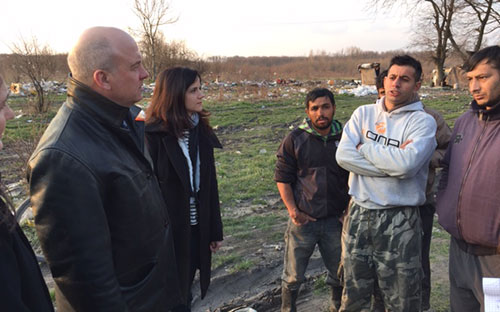“Serbia has to show more resolve in addressing the legacy of the past, to improve the fight against discrimination and to establish a safer media environment” said Nils Muižnieks, Council of Europe Commissioner for Human Rights, while releasing the report based on his visit to the country carried out from 16 to 20 March 2015.
The persistent impunity for certain serious human rights violations adversely affects justice and durable peace in the region. “Serbia should urgently address this situation, in particular by strengthening the War Crimes Prosecutor’s Office, guaranteeing effective protection to witnesses and ensuring that all victims of serious human rights violations have effective access to justice and to full and effective reparations. Additional efforts are also needed to resolve the pending cases of missing persons in Serbia and in the region.”
Almost 90 000 forcibly displaced persons in Serbia – among them 23 000 Roma from Kosovo* - remain in need of durable solutions. “Most of them live in seriously substandard conditions and many Roma remain without access to adequate housing and quality education. Although important measures have been undertaken to ensure systematic birth registration and provide identity documents to Roma, some 3 800 still remain stateless or at risk of statelessness and without access to basic social and economic rights. Serbia should redouble its efforts to resolve these long-standing issues. A step forward would be to accede to the Council of Europe treaties on nationality and statelessness”.
Welcoming the enhancement of Serbia’s antidiscrimination framework, the Commissioner exhorts the authorities to apply dissuasive sanctions for all hate crimes in order to prevent recurrence. He also recommends providing the national human rights structures with all necessary resources and support, while fully respecting their independence.
Persons with disabilities continue to suffer from discrimination and high levels of unemployment. Serious problems remain also as regards the many persons with intellectual and psycho-social disabilities, including children, who are kept in large institutions for social care. “The authorities should accelerate the deinstitutionalisation process and provide community-based services. They should also amend legislation to avoid depriving persons with disabilities of their full legal capacity, so as to ensure that these persons enjoy legal capacity on an equal basis with others in all aspects of life.”
Women too continue to be discriminated against in many fields and are facing an unprecedented level of domestic violence. “In the first three months of 2015, 26 women have been killed by their partners, almost as many as in 2014 and more than half the number of women killed in 2013. Serbia needs to ensure that acts of violence against women, including domestic violence, do not go unpunished and that dissuasive penalties are imposed on all perpetrators. Collecting disaggregated data on gender-based violence is also needed to assess the root causes of this phenomenon and better combat it.”
Some progress has been made in the protection and promotion of the human rights of LGBTI persons which is reflected in particular in this community’s strengthened dialogue and co-operation with the authorities. Nevertheless, homophobia and discrimination against them persist, in particular in the workplace, and should be addressed by the authorities.
Lastly, the Commissioner welcomes the strengthening of the legislative framework concerning media freedoms, but remains seriously concerned about the highly polarised and politicised environment in which media in Serbia operate today. This seriously undermines concrete progress in this field. “Politicians must put an end to inflammatory remarks against journalists and other forms of pressure on the media that have led to self-censorship and discouraged journalists from performing their important role in informing the public.” He also recommends accelerating the investigations into the assassinations of three journalists that occurred between 1994 and 2001, and ensuring that all those responsible are brought to justice.
- Read the report following the visit to Serbia from 16 to 20 March 2015
- Read the comments from the national authorities
- Read the report in a nutshell
* All references to Kosovo, whether to the territory, institutions or population shall be understood in full compliance with United Nations Security Council Resolution 1244 (1999) and without prejudice to the status of Kosovo.



